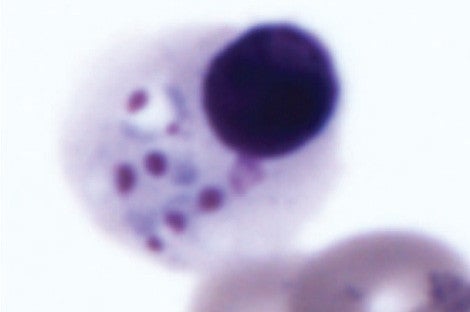For immediate release: Thursday, May 7, 2015
Boston, MA – Researchers at Harvard T. H. Chan School of Public Health and the Broad Institute have identified a protein on the surface of human red blood cells that serves as an essential entry point for invasion by the malaria parasite. The presence of this protein, called CD55, was found to be critical to the Plasmodium falciparum parasite’s ability to attach itself to the red blood cell surface during invasion. This discovery opens up a promising new avenue for the development of therapies to treat and prevent malaria.
“Plasmodium falciparum malaria parasites have evolved several key-like molecules to enter into human red blood cells through different door-like host receptors. Hence, if one red blood cell door is blocked, the parasite finds another way to enter,” said senior author Manoj Duraisingh, John LaPorte Given Professor of Immunology and Infectious Diseases at Harvard Chan. “We have now identified an essential host factor which when removed prevents all parasite strains from entering red blood cells.”
The five-year study was carried out in collaboration with labs at Harvard Medical School and the Broad Institute. It appears online May 7, 2015 in Science.
Severe malaria is one of the leading causes of mortality among children globally. During infection, parasites invade and replicate within red blood cells. With resistance to malaria drugs increasing, researchers are desperate to find new ways to prevent and treat the disease.
Lead author Elizabeth Egan, research fellow in the Department of Immunology and Infectious Diseases at Harvard Chan and instructor in pediatrics at Boston Children’s Hospital, and colleagues developed a new technique to tap into a relatively unexplored area — identifying characteristics of a host red blood cell that make it susceptible to the parasites. Red blood cells are difficult targets for such efforts as they lack a nucleus, which makes genetic manipulation impossible.
The researchers transformed stem cells into red blood cells, which allowed them to conduct a genetic screen for host determinants of P. falciparum infection. They found that malaria parasites failed to attach properly to the surface of red blood cells that lacked CD55. The protein was required for invasion in all tested strains of the parasite, including those developed in a laboratory as well as those isolated from patients, making it a primary candidate for intervention.
“The discovery of CD55 as an essential host factor for P. falciparum raises the intriguing possibility of host-directed therapeutics for malaria, as is used in HIV,” said Egan. “CD55 also gives us a hook with which to search for new parasite proteins important for invasion, which could serve as vaccine targets.”
This study was supported by a Gates Foundation Grand Challenges Exploration Award OPP1035276 (M.T.D.), National Institutes of Health (NIH) grant R01AI091787 (M.T.D.), a Pediatric Scientist Development Program Fellowship from the Eunice Kennedy Shriver National Institute of Child Health and Human Development K12-HD000850 (E.S.E), NIH grant K08 1K08AI103034-01A1 (E.S.E.), Boston Children’s Hospital Faculty Development Award (E.S.E.), NIH grant K01DK098285 (J.A.P.), and the Cambridge Biomedical Research Center, UK (M.P.W. and L.V.N.).
“A forward genetic screen identifies erythrocyte CD55 as essential for Plasmodium falciparum invasion,” Elizabeth S. Egan, Rays H.Y. Jiang, Mischka A. Moechtar, Natasha S. Barteneva, Michael P. Weekes, Luis V. Nobre, Steven P. Gygi, Joao A. Paulo, Charles Frantzreb, Yoshihiko Tani, Junko Takahashi, Seishi Watanabe, Jonathan Goldberg, Aditya S. Paul, Carlo Brugnara, David E. Root, Roger C. Wiegand, John G. Doench, Manoj T. Duraisingh, Science, online May 7, 2015
Visit the Harvard Chan website for the latest news, press releases, and multimedia offerings.
For more information:
Todd Datz
tdatz@hsph.harvard.edu
617-432-8413
Photo: Amy Bei/Harvard Chan
###
Harvard T.H. Chan School of Public Health brings together dedicated experts from many disciplines to educate new generations of global health leaders and produce powerful ideas that improve the lives and health of people everywhere. As a community of leading scientists, educators, and students, we work together to take innovative ideas from the laboratory to people’s lives—not only making scientific breakthroughs, but also working to change individual behaviors, public policies, and health care practices. Each year, more than 400 faculty members at Harvard Chan teach 1,000-plus full-time students from around the world and train thousands more through online and executive education courses. Founded in 1913 as the Harvard-MIT School of Health Officers, the School is recognized as America’s oldest professional training program in public health.
